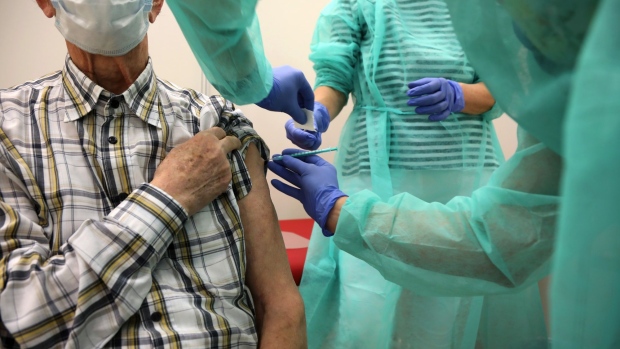Mar 1, 2021
EU Health Chiefs Urged to Up Their Game Amid Vaccination Spats
, Bloomberg News

(Bloomberg) -- European Union health ministers were told Monday they need to scale up coronavirus vaccinations amid a split among governments on regimens and an underwhelming rollout of shots that’s left the bloc battling with prolonged lockdowns.
On a video call with ministers, EU Commissioner Stella Kyriakides said that more mass testing and genome sequencing are needed to track mutations, according to two officials familiar with the discussion. In addition to improvements in detection, the bloc’s health chief warned governments they need to accelerate inoculations in the weeks and months ahead to match the increasing pace of deliveries.
The push comes as governments across the bloc face increasing pressure from voters and businesses for a roadmap to end lockdowns and restrictions. But initial delays in the procurement and regulatory approval of the vaccines are now being exacerbated by a European cacophony over their use, and slow progress in delivering doses.
Despite approval for AstraZeneca Plc’s shot for all adults by the EU’s drugs regulator, governments and national authorities in countries including Germany have cast reservations over its effectiveness among seniors. While there are indications that they are now changing tack, comments from leaders including France’s Emmanuel Macron have sowed doubt among the public.
On Monday, Markus Soeder -- Bavaria’s premier and a potential chancellor candidate -- called on Chancellor Angela Merkel’s federal government to change Germany’s vaccine strategy, which would allow the immediate use of unused AstraZeneca doses.
“We cannot leave one single dose lie around unused,” Soeder said.
Governments are also split over the the dose regimen. During a video summit last week, Italian Prime Minister Mario Draghi urged EU leaders to follow the U.K’s example of prioritizing administering the first dose of available vaccines to as many people as possible, rather than adhering to a strict schedule for the second dose.
Hungary is changing its vaccination strategy along these lines to have as many people as possible get a first shot.
“To different extent, but the first dose of vaccines already provides significant protection, at least when it comes to serious complications or deaths,” Chief Medical Officer Cecilia Muller told a televised briefing on Monday.
Others, meanwhile, blame the slow approval process for the delays. Kyriakides told ministers on Monday that the European Medicines Agency is set to recommend the authorization of Johnson & Johnson’s vaccine in the next ten days, the latest approval to come after the U.S. has authorized a shot.
It’s administered three times as many population-adjusted doses of coronavirus vaccines than the EU.
“I find it incomprehensible that the European Medicines Agency would take another two weeks to examine approval of the Johnson & Johnson vaccine,” Stephan Weil, premier of the German state of Lower Saxony, said Monday in an emailed statement. “The vaccine was approved in the USA over the weekend as part of an emergency process. Why can the responsible committee in Europe only issue a recommendation in mid-March?”
©2021 Bloomberg L.P.